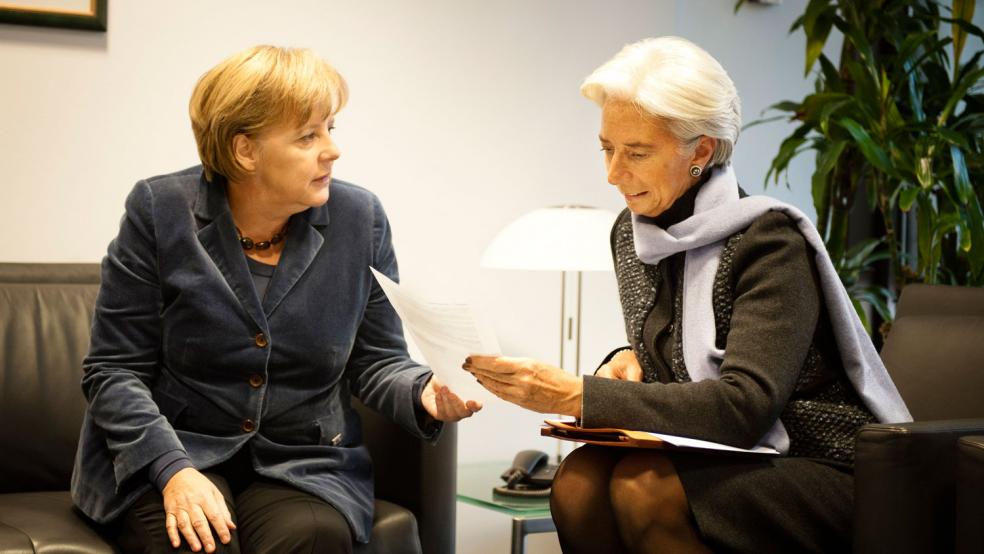BERLIN – The European Union passed the first in a series of critical reforms today, establishing a new centralized supervisory authority over the monetary union’s largest banks.
In October 2014, European Central Bank will have access to financial data for banks across the continent. This authority will be used to identify bank weaknesses before they threaten the EU, as they did during the European sovereign debt crisis.
It’s the first of three pillars that European leaders say would guarantee a similar crisis doesn’t occur in the future. The other two – the creation of a joint deposit guarantee account and the authority to wind down banks with a unified financial backstop – will be considered in the coming year.
The passage of the first pillar is another sign of economic progress for a continent where the news has been bleak for years. The EU and the world have two people in particular to thank for that progress: German Chancellor Angela Merkel and International Monetary Fund chief Christine Lagarde.
In a sign of just how far the EU has come, Jose Manuel Barroso, the Portuguese president of the European Commission, on Wednesday offered a brighter forecast for the European economy. In his annual State of the European Union address in Strasbourg, Barroso said that things are finally getting better.
“The recovery is within sight,” Barroso said. “This should push us to keep up our efforts. We owe it to our 26 million unemployed.”
He stressed that the continent still faced “economic heavy weather” ahead. While the entire monetary union is no longer in recession, debt-plagued countries like Italy have yet to turn things around. In Spain, 56 percent of people under the age of 25 are unemployed. Greece is still skirting the line between solvency and collapse and may have to receive a third bailout from the European Central Bank this fall.
But his more positive perspective represents a stunning about face from where the EU stood three years ago. At the beginning of 2010, there were real fears that the debt crisis in Greece and other countries would destroy the European economy. Kicking out nations that had lied about their finances – Greece included – was being seriously considered in Berlin and Paris. Anxieties were high that the euro zone could collapse, taking the fragile U.S. economy with it.
Now, the EU has passed the first of a set of reforms that many members had resisted over the years. It’s the first step toward a full-fledged banking union that could bring thousands of the continent’s financial institutions under centralized oversight, putting the ECB on a path to become the European Federal Reserve.
Two years ago, this kind of oversight would have been unthinkable to many EU members – and especially to some in Germany.
STEADY THROUGH THE CRISIS
The path to a banking union, and other economic reforms, has been far from smooth, but as these signs of progress emerge, Merkel can now take the credit for coming up with the strategies that saved the euro zone, all while staying calm (some would also say dull). At least the German people love her for it: She’s expected to coast in federal elections being held here a week from today.
Merkel was present from the start of the crisis, and Lagarde joined her in 2011 when she became IMF chief. Both pushed through tough, unpopular and controversial reforms, as well as an increase in the power of the ECB. For instance, in 2010 and 2011, the Greeks and Spaniards vilified Merkel and her government for demanding that they make steep spending cuts in exchange for help from the ECB. At the same time, critics at home accused her bailing out countries with lazy workers and corrupt governments.
"It shows that her rescue strategy is working. She’s seen as the architect of Europe regrowth,” Christian Schulz, a senior economist at Berenberg bank, said. "We've seen reforms... [Struggling European countries are] not having a credit-fueled recovery and she’s seen as the architect."
GROWTH STILL A CHALLENGE
While Merkel’s policies staved off disaster, they’ve hardly been a catalyst for significant economic growth. Some critics charge that her austerity policies held back growth as opposed to fostering it.
For instance, Germany is expected to show only a modest 0.4 percent GDP growth this year, with 1.8 percent growth projected for 2014. In the entire EU, GDP is set to shrink 0.1 percent this year and then turn positive in 2014 with 1.2 percent growth, according to EU forecasts.
Merkel still has to convince reluctant politicians in her country to accept the other two pillars of reform, a notion many here have resisted because they believe Germany would end up responsible for irresponsible banks.
THE MUSCLE IN BRUSSELS
While Merkel has spearheaded reforms at the national level, Lagarde has pushed for reforms at the EU. The contradiction that led to the crisis is a difficult one to solve: the EU is a monetary union that doesn’t share fiscal policy. Lagarde has been working behind the scenes for two years to push for greater EU coordination. Lagarde’s constant lobbying is one of the primary reason large-scale banking reforms, once thought a threat to the future EU, are now being considered.
“We very much think of the euro area as a beautiful ship that has been built, nurtured … for the soft seas, but which is not yet completely finished for the rough ones," Lagarde said in Paris Tuesday. "A lot has been done in relation to banking union. If I have a message today it is that that particular part of the ship needs to be finished, needs to be completed and speed is of the essence."





